Qatar’s World Cup, from the inside out
The Take counts down to the 2022 World Cup.
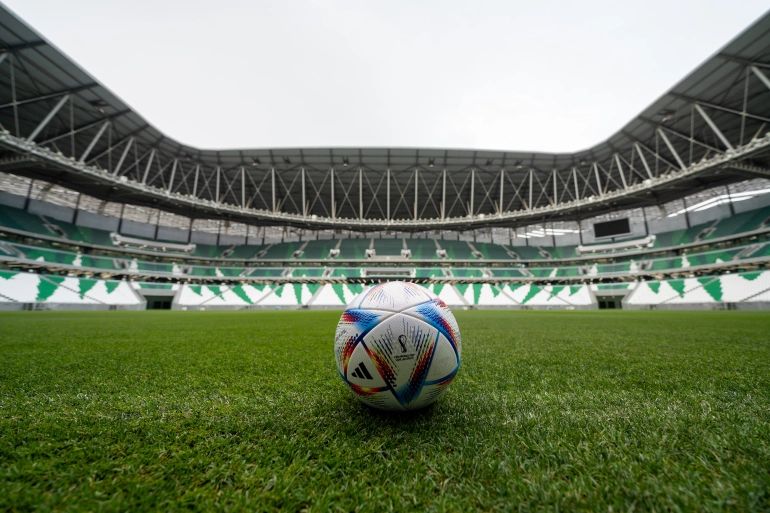
The World Cup is about to head to the Middle East for the first time. Ever since it was announced back in 2010 that the tournament would be held in Qatar, the country has been getting ready to host the world’s biggest sporting event. In this episode, the first in The Take’s coverage of the World Cup, we look at some of the preparations for the tournament, their associated controversies and a preview of what we might expect after kickoff.
Keep reading
list of 4 itemsIran’s Gen Z movement and the hashtag wars
Revisiting the hidden US war in Somalia
Did police cause Indonesia’s football stadium disaster?
In this episode:
- Tony Karon (@TonyKaron), editorial lead at AJ+
- Sohail Malik (@SohailAJE), sports reporter, Al Jazeera
Connect with us:
@AJEPodcasts on Twitter, Instagram, and Facebook
Full episode transcript:
This transcript was created using AI. It’s been reviewed by humans, but it might contain errors. Please let us know if you have any corrections or questions, our email is TheTake@aljazeera.net.
Newsreel: The countdown is officially underway to the biggest football tournament in the world.
Malika Bilal: Back in 2010, when it was announced that Qatar would host the 2022 World Cup…
Malika Bilal: The country’s residents were thrilled.
Newsreel: We are proud to become the first Arab and Middle Eastern country to host the World Cup.
Malika Bilal: I was thrilled, too. I was there in 2010, working at Al Jazeera, at our headquarters in Doha. And ever since, I’ve been excited to cover the first World Cup in the Middle East – which is why this was one of the last episodes I worked on before my parental leave.
Over the next weeks, we’ll be bringing you some of the tournament’s biggest stories.
But first, we have a look at the preparations for this World Cup – including all of their controversy – and a preview of what we might expect.
I’m Malika Bilal and this is The Take.
[THEME MUSIC PLAYING]
[MUSIC PLAYING]
Malika Bilal: Today, I’m speaking with Tony Karon. He’s the editorial lead at AJ+. He also hosted a podcast for Al Jazeera about the 2018 World Cup, called The Game of Our Lives. And this time around, he’ll be on our show often, as a kind of resident scholar on football, soccer – whatever you’d like to call it.
Tony Karon: It’s a great honour to be your World Cup analyst. I’ve been writing about the World Cup and obsessively following football for 40 years now. So I’ve never played the game. I’ve never coached the game.
[SOUNDS FROM A FOOTBALL MATCH]
Tony Karon: But I have been in the pews, most of my adult – even most of my childhood life.
Tony Karon: So, definitely as a journalist, I’ve always been very aware of underlying meanings of what happens on a football field, and the way I think about the game is most inspired by something that the great Trinidadian political writer CLR James once wrote about cricket. He was trying to capture the anticolonial meaning of cricket. And he had used this aphorism – what do they of cricket know who only cricket know. I.e. You don’t really understand what’s happening in a football stadium unless you know about everything that’s happening outside of that football stadium.
Malika Bilal: Which is a perfect segue because that’s exactly what we want this World Cup preview to be about.
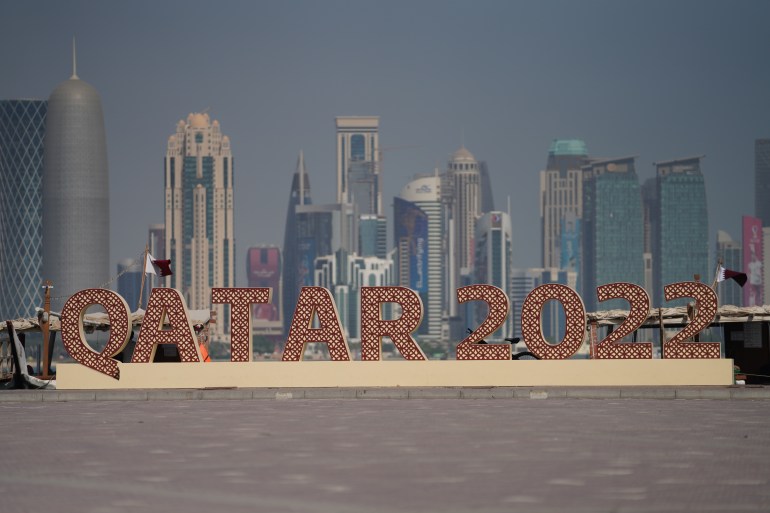
[MUSIC PLAYING]
Malika Bilal: So let’s start at the beginning. What was your reaction when you found out that the World Cup would be held in Qatar?
Tony Karon: I was excited. I thought, you know, having the World Cup hosted in an Arab country for the first time is a very important move, that breaking of the duopoly that had for most of the history of the tournament been between Europe and Latin America as where the hosting country would be. The first Asian World Cup had happened in 2002 in Korea and Japan. And the first African World Cup had happened in 2010 in my home country, South Africa. And so, to stage a World Cup in the Arab world was a recognition of the global reach of the game, the importance of Arab players and Arab fans. So, I think it was part of a broadening of the epicentres of the game.
Malika Bilal: So in addition to being the first in the Middle East, it’s also the first winter World Cup. What is the significance of that?
Tony Karon: Obviously, Qatar in summer is too hot to stage a World Cup. So, this World Cup is being held in winter. What that means is that the domestic professional league programs of all of the countries in the northern hemisphere, but obviously Europe, particularly, which is the epicentre of the global game, now have a season that’s disrupted by a midyear, you know, month-long break.
[MUSIC PLAYING]
Tony Karon: But what it really represents is a deeper power struggle over the global game between two rival centres, the one being FIFA and the confederations that represent the national teams, and the other being the European clubs, which are the most powerful entity in, in the game. So, we also have to be frank. The World Cup is no longer the pinnacle of the global game.
Malika Bilal: That’s because that title now belongs to club football – especially with tournaments like the Champions League, which pits the best European club teams against each other.
Tony Karon: You’ll probably see more of the world’s best players on the field in that game than you would in a World Cup final.
Malika Bilal: And, and why is that?
Tony Karon: That’s because since the 1990s, globalisation has basically opened up the European club leagues to be the equivalent of, you know, what the NBA is in basketball. If you look at, say, the team that Brazil takes to the World Cup, a guaranteed, of the 27 players that they have in their squad, no more than two or three will actually play their weekly football in Brazil. All of them will be based in the top European clubs.
Malika Bilal: And that’s the case for most Latin American and African teams – their players are on the payroll of European clubs.
Tony Karon: That’s where the money is in the game. And it attracts the most highly skilled players. And also, by the way, it’s watched. Like, we know the World Cup final itself is watched by a billion people live, which is incredible. What’s an interesting parallel, though, is the number of people in Africa alone that tune in live every weekend to an English Premier League game is 400 million. It’s all about money.
Malika Bilal: So what we have now is a power struggle over the world’s most popular sport. FIFA, the sport’s international governing body, is pushing for more viewers.
Newsreel: FIFA is intensifying its push for a World Cup every other year.
Newsreel: Cynics will say the reason FIFA want to do this is because they want to increase their revenues.
Malika Bilal: And a World Cup every two years would mean less time for the club teams, who are also trying to solidify their hold on the game.
Tony Karon: They’ll all dress it up as, oh, this will be good for the game. But it’s all about two rival business centres competing for this prize. The political analogy, comparing the World Cup to the Champions League, think about the United Nations General Assembly. Hypothetically, that is the most representative body in terms of world politics, it would be, you would think, the pinnacle of global governance. And yet, we all know that the UNGA is almost entirely a symbolic venue and the power is in the hands of the UN Security Council, which includes, you know, the five unelected, permanent members who all have veto power, etc. In some ways that’s an analogy with where global football is right now, that the European clubs are the equivalent of the Security Council, perhaps without quite the veto power. There’s a bit more of a balance, but it’s that sort of distinction.
Malika Bilal: Tony, this is why we love having you on, because you can unite the political science nerds among our listeners with the football nerds, amongst our listeners and, and, and merge them together. Thank you for that insight.
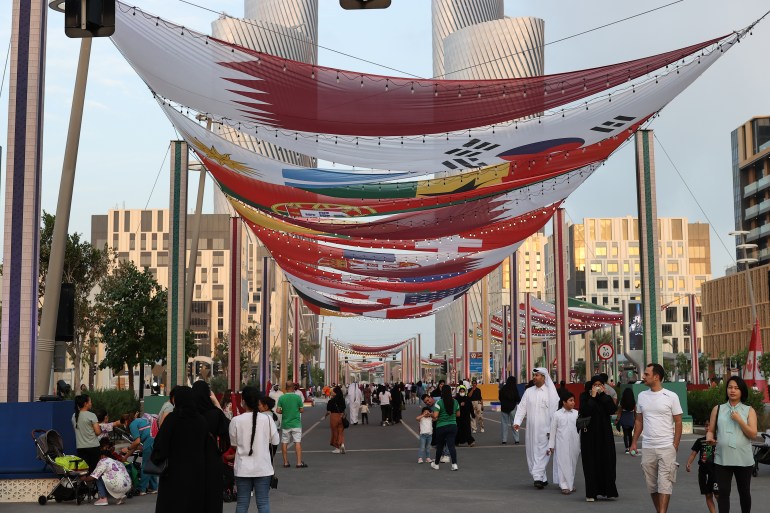
[MUSIC PLAYING]
Malika Bilal: We’ll hear more from Tony in a bit. But first, a dispatch from Doha, where Al Jazeera’s Sohail Malik has been watching tournament preparations take place for more than a decade.
Sohail Malik: I’m a sports reporter here working for Al Jazeera English in Qatar, been here for just under 20 years and super hyped about this competition that’s going to be happening in Qatar. We’re just gearing up for it every single day. The countdown is on.
Malika Bilal: And it’s a countdown nearly 12 years in the making. Sohail was at the Al Jazeera offices back in 2010, when FIFA revealed Qatar would be hosting.
Sohail Malik: What I remember was, that moment when Sepp Blatter, the former president of FIFA, you know, he made the big announcement and he went, ‘Qatar!’ Wow.
[MUSIC PLAYING]
Sohail Malik: For a split second, it was shock. For another split-second euphoria. And then the next split second, a massive eruption of people shouting in the newsroom. I haven’t heard a shout, a scream, a bit of cheering like that in this newsroom. I’ve been at Al Jazeera for, you know, 17 years, around. Nothing, nothing has made an eruption like that before. And it’s a building that’s not full of Qataris. It’s a very, multinational cosmopolitan place, the Al Jazeera newsroom. So, we’re talking mainly expats here. And that moment was a moment of celebration by a group of people that kind of felt that Qatar was now their home and they were taking part in it. And that’s what I remember this moment of overjoy that, uh, I’ve not come across since, since being in Al Jazeera for all those years more.
[MUSIC PLAYING]
Malika Bilal: After you left the newsroom, you could see the euphoria on the streets. That’s where I was that day. I remember it very vividly. I went to Katara, the cultural centre in Doha for the announcement. And it was pandemonium. I have never seen such excitement. And it was as though Qatar had won the actual World Cup and not just the bid to host it.
Sohail Malik: It was funny, you mentioned that, about it was like Qatar actually won it. In colloquial terms, when you talk to people at the time, people over here used to refer to it as “when Qatar won the World Cup”. It actually became, you know, a way how people used to express themselves at the time. Remember, this has never happened before, you know, a Middle Eastern country having the World Cup.
Malika Bilal: And that excitement was palpable that night. Here’s what one Qatari resident said.
Qatari resident: What happened today is only the beginning. We should double our efforts from now on. Hopefully, now we will all double our efforts as Arabs, Muslims and Qataris to organise a tournament that will be remembered for generations to come.
Sohail Malik: Already five, 10 minutes after the announcement, people were dashing to congregate at these places to celebrate. And I just remember, as soon as I left Al Jazeera, traffic had already started backing up.
Newsreel: Well, this is Doha’s main Corniche street. It’s actually a three-lane highway, but as you can see, no one is going anywhere.
Malika Bilal: So that was 12 years ago. You’ve been in Doha ever since. What kind of changes have you noticed in Qatar since then? How has the landscape changed? How has security changed? How has life changed?
Sohail Malik: Every single day when I drive my car to work or I drive somewhere, it kind of feels like I’m seeing something new. You have those kind of places where it’s just for you and your friends. It’s a hidden gem. Right, they’re yours. That’s how Qatar was as a country before. Since then Qatar has just exploded. Especially since getting this World Cup, the landscape is completely different. Just look at the skyline of Qatar, where you see all the big buildings in the west bay area. I think since, in the last 10, 12 years, the number of buildings, I don’t know the exact figures, but it kind of looks like it’s doubled.
Malika Bilal: As Sohail tells it, Doha basically became a construction site once the hosting announcement was made. And it wasn’t just fancy skyrises popping up.
Sohail Malik: We used to have not the best roads you could say. Some of them were narrow. We had roundabouts, which used to maybe intimidate a lot of people that came to drive in Qatar. You probably remember them well.
Malika Bilal: Yes. You take your life into your hands at every roundabout.
Sohail Malik: Yeah. The road system here has completely been redeveloped. You’ve got a Metro system now as well. So, you know, the whole landscape and character of Qatar has changed. It’s a completely different place.
Malika Bilal: And has this been in preparation for the World Cup or is this separate?
Sohail Malik: It is a mix between both, because obviously, Qatar had much more grand visions beyond just hosting the World Cup. So whether the World Cup happened or not, there was always going to be mass development in Qatar. It’s a very ambitious country. Most of the things have come up, are going to benefit the World Cup, are going to make being at the World Cup better for the people coming.
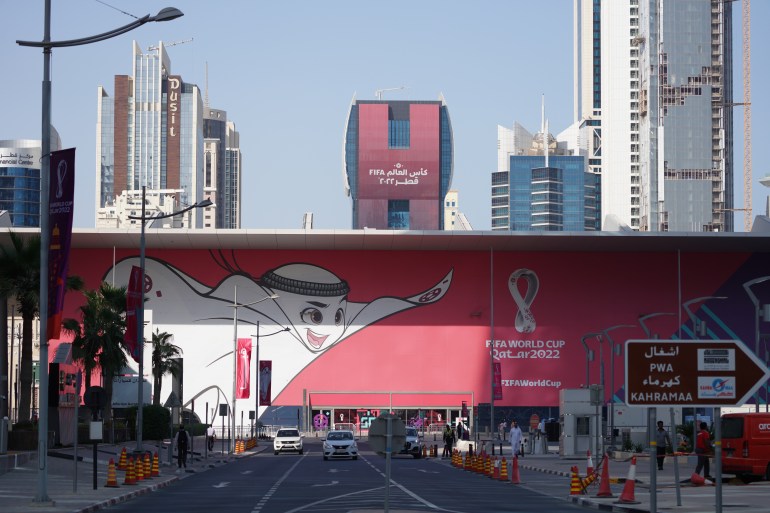
[MUSIC PLAYING]
Sohail Malik: But I just want to make it another point here. They’re not just building over here things that will be useless afterwards. When people come here, they’re going to be temporary accommodations that will be pretty much gone when the World Cup is over. If you look at the plan, there’s a traditional Arabian-style fan village, where people can choose to say if they want, it’s got those old-fashioned, Bedouin-style tents, which inside actually they’re pretty kitted out and pretty luxurious. And also, we’ve got cruise ships coming to Qatar that are going to be docked on the shore where fans can stay as well. So, there has been a fair bit of foresight not to be left with the city of white elephants after the tournament.
Malika Bilal: So finally, Sohail, as a resident of Doha, what do you hope that visitors might see, or might take away from this experience that they might not have expected?
Sohail Malik: I really want people to experience how the football culture is over here and a lot of it revolves around shisha, around hookah cafes. When there’s a big night and in the Champions League, or if Qatar are playing, you have to book a place literally in a shisha cafe, because it’s going to be wild. At the last World Cup, maybe it’s because of England’s history – I’m from England – history in the region, it is the most unpopular team, whenever there’s a World Cup. So, I remember last time when England went to the semi-finals, I was at these cafes most of the time and they played Colombia. I was literally on my own getting heckled the whole time by everyone. There were no Colombians in that cafe, but everyone became Colombian just in the hope that England go out. So, there’s always that banter. There’s always that commotion. So, I really hope people buy in and try to experience the local football culture.
[MUSIC PLAYING]
Malika Bilal: With all of the construction Sohail mentioned, there’s also been controversy.
Newsreel: Qatar’s World Cup in 2022 has thrown the spotlight on the welfare of those who are building the venues for football’s showpiece.
Newsreel: Every knock alters Doha cityscape beam by beam. The country capital is growing on the backs of these men. Migrant workers who’ve left families and homes eager for opportunity.
Newsreel: Criticism persists about the treatment of the army of migrant workers who have made this World Cup a reality.
Malika Bilal: Concerns about the conditions for the workers building the stadiums for the World Cup have cast a dark shadow on Qatar’s hosting. Here’s Tony Karon again, to break that down.
Tony Karon: We have seen for a number of years now that very credible international human rights and labour rights organisations have made extensive studies of conditions in Qatar and have produced reports. Amnesty International, Human Rights Watch, and the International Labour Organization would be three that come to mind that have detailed quite shocking experiences and abuses of the migrant labour workforce that has been building stadiums in Qatar.
Malika Bilal: It’s something Al Jazeera has documented as well; here’s what Deepak Biswas, an air conditioning fitter who came to Qatar from India, told the network back in 2012, as the construction boom took off.
Deepak Biswas: My family don’t know I live like this. They would worry about us. That’s why we don’t tell them. I paid the agent in India about $1,400 to come here. I’ve just finished paying the loan off, but have nothing left.
[MUSIC PLAYING]
Tony Karon: So, World Cup stadiums are always built by migrant labour. Even within Brazil or within South Africa, it wasn’t as if this was like a neighbourhood workforce that turned its attention to this project, obviously. And the conditions of migrant labour in many countries, the power of those workers is much more limited by a virtue of being migrants. In the Gulf that’s been a much more intense problem. There isn’t much of an indigenous working class in the Gulf and the conditions in the region for migrant workers have been, ones that would not be acceptable in many parts of the world. Now the country authorities have acknowledged the problem. They have investigated over the years, responded to the investigations, passed new laws, promised, you know, to improve things. And I think by all accounts, there have been significant improvements relative to what had gone before and relative, perhaps to the norms of the Gulf.
Malika Bilal: Over the years, there have been protests, including by football players themselves. Here’s what Nasser Al Khater, the 2022 World Cup CEO, told Al Jazeera last year about those protests.
Nasser Al Khater: So people really need to see the amount of work that Qatar has put the progress it has made. They need to put it into context of the region and where Qatar stands in the region.
Tony Karon: I don’t think this issue will disappear before the World Cup. I think if anything, we’re more likely to see it escalate. And I think you might see some concrete, demands being the focus of that kind of protest action, particularly, on the question of compensation to families whose loved ones died in the building of stadiums in Qatar.
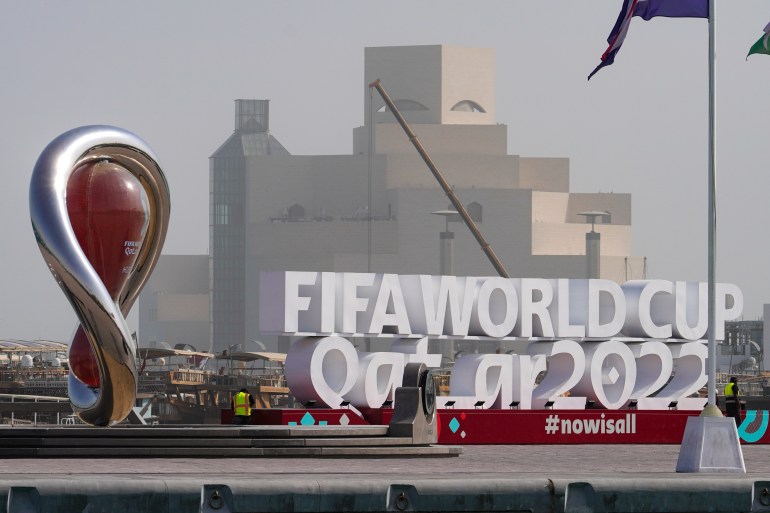
[MUSIC PLAYING]
Malika Bilal: You mentioned protest actions. At the 2018 World Cup in Russia, we saw protestors with the Russian feminist punk group, Pussy Riot run the field.
Newsreel: There was some unexpected drama on the soccer pitch at the World Cup final Moscow. And it had nothing to do with the game itself.
Newsreel: Four people charged the pitch all at the same time, about 52 minutes into the game.
Newsreel: One activist was able to give French star, Kylian Mbappe, a double high five. Another was less lucky, tackled by Croatian player Dejan Lovren.
Malika Bilal: They were protesting political rights in Russia. Are you expecting any protests or moments like that, which were definitely attention-grabbing, this time around?
Tony Karon: I would be shocked if there weren’t moments of protest. I mean, if you think about it, the World Cup gives you a captive audience of more than a billion people live in real-time. Given what we’ve seen already in terms of issues being raised about worker rights in Qatar, issues being raised about LGBTQ rights in Qatar, I think it’s certainly a safe bet that there will be some forms of action. You’ve even seen discussions, for example, the Qatari minister responsible for policing having to discuss, well, what will happen if somebody raised the rainbow flag in a stadium? And then, him saying, well, that would be confiscated. We don’t allow flags to be raised in stadiums. But you can see why any group that is needing to make a point will find it very tempting to do, because it’s a very difficult position for the host. Because whatever you do in response to some sort of protest creates its own momentum and creates its own set of issues.
Malika Bilal: So finally, Tony, we have talked about the importance of the World Cup being hosted in Qatar, but how much do you think location actually matters in the end?
Tony Karon: You’re reminding me of something that I began to think about after 2010.
[SOUND FROM 1950 WORLD CUP]
Tony Karon: And if you take the arc from the 1950 World Cup in Brazil, in Maracana stadium. It’s Brazil-Uruguay, Uruguay wins. It’s like a historic disaster in Brazilian culture. And, basically what’s interesting about that game is it’s an experience shared in real-time by a hundred thousand people, all of whom are inside the stadium. They’re physically present. Most of the world hears about what happened in that game, the following day.
Malika Bilal: But fast forward to 2014.
[SOUND FROM 2014 WORLD CUP]
Malika Bilal: The final was between Germany and Argentina. It took place in that very same stadium in Brazil. And this time, more than a billion people tuned in from around the world.
[MUSIC PLAYING]
Tony Karon: What satellite technology has done has made this an intimate, shared, real-time experience. And then if you look at the statistics on social media, like it’s the biggest single day of sharing, like billions and billions of interactions. So, this global electronic crowd sharing a real-time moment is also behaving like a crowd. They’re literally talking to one another on their devices. And I remember thinking to myself, after 2014, it’s like, if you imagine, you know, an era where there’s space tourism and you can create gravity, you could hold a World Cup in a spaceship and the world would still share it in the same way. Because for most of us, it’s a very real and vivid experience. We can recall minute by minute what’s happening, but you don’t have to be there.
Malika Bilal: And that’s The Take. We’re excited to share the world’s biggest sporting event with you, wherever you may be. You can reach out to us on Twitter and Instagram at AJE Podcasts, with what stories you’re looking at. And even if you’re not the biggest football fan, we’ll have something for everyone in our coverage over the coming weeks. Stay tuned. This episode was produced by Negin Owliaei with Chloe K. Li, Ruby Zaman, Alexandra Locke, Amy Walters, and me, Malika Bilal. Alex Roldan is our sound designer. Aya Elmileik and Adam Abou-Gad are our engagement producers. Ney Alvarez is our head of audio. We’ll be back.
Episode credits:
This episode was produced by Negin Owliaei with Chloe K. Li and our host, Malika Bilal. Ruby Zaman fact-checked this episode.
Our production team includes Chloe K. Li, Alexandra Locke, Ashish Malhotra, Negin Owliaei, Amy Walters and Ruby Zaman. Our sound designer is Alex Roldan. Our engagement producers are Aya Elmileik and Adam Abou-Gad. Ney Alvarez is Al Jazeera’s head of audio.